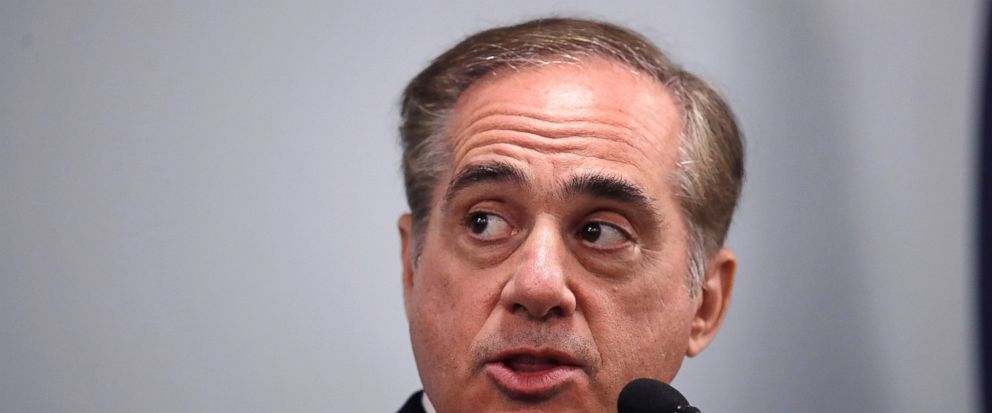VA touts private health care for vets but cost issues linger
Veterans Affairs Secretary David Shulkin touted an overhaul plan Tuesday to give veterans even wider access to outside doctors than under its troubled Choice health care program, stressing ties with the private sector even while acknowledging key questions of rising cost and sharing of medical records were still unresolved.
Testifying at a House hearing, Shulkin provided new details on the VA's plan to permanently replace the Veterans Choice program. Acknowledging the program would run out of money sooner than expected, he urged Congress to act by year's end to provide stopgap funding and loosen restrictions to ensure timely, quality treatment for veterans when unavailable at VA medical centers.
Veterans should get "more choice in the say of their care," Shulkin told the House Veterans Affairs Committee. "Nobody should feel trapped in the VA system."
Still, faced with repeated questioning from lawmakers, Shulkin conceded that an upgraded VA information technology system needed to reduce delays and ensure a smooth sharing of medical records with outside doctors was still seven to eight years away and that the White House budget office also had yet to approve the costs of its proposal. Major veterans' organizations generally oppose paying for Choice by reducing veterans' disability benefits or with cuts to core VA health programs.
"This program will require offsets," Shulkin said.
His remarks underscored significant change underway at the VA, drawing both praise and consternation after a 2014 wait-time scandal at the Phoenix VA medical center and big campaign promises from President Donald Trump to expand "choice" for veterans.
"Veterans' health care should not be subjected to offsets or pay-fors, and the full burden of providing care for service-disabled veterans needs to be borne by the federal government," said Roscoe Butler, a deputy director for The American Legion, the nation's largest veterans group. He called the initial proposals a "great start" that needed adjustments to protect against erosion of VA medical centers.
Dubbed Veterans CARE, the VA proposal would eliminate Choice's current restrictions that veterans can go outside the VA network only in cases where they had to wait more than 30 days for an appointment or drive more than 40 miles to a facility.
Veterans would get outside referrals based on "clinical need," consulting with VA health providers about their medical problem. The health provider and patient would then jointly decide whether it was best to receive care within the VA or with a private doctor. A veteran could take into account the length of time waiting for a VA appointment, poor performance at the local VA hospital based on department ratings, or if the VA can't provide the service.
Veterans also would be able to access walk-in clinics, such as MinuteClinics, to treat minor illnesses or injury — subject to some new copayments.
The House Veterans Affairs Committee led by Rep. Phil Roe, R-Tenn., is crafting a separate proposal aimed at providing an integrated network of private and VA care. Generally, fewer restrictions for veterans to access private care would mean higher costs to VA.
"We still need to figure out how to pay for all these improvements — which will be no easy or pleasant feat for any of us," Roe said.
During the 2016 campaign, Trump repeatedly pledged to fix the VA by bringing accountability and expanding access to private doctors, criticizing the department as the "most corrupt." In July, he promised to triple the number of veterans "seeing the doctor of their choice."
More than 30 percent of VA appointments are made in the private sector.
Some groups are already drawing political battle lines, with the left-leaning VoteVets and the American Federation of Government Employees warning of privatization and Concerned Veterans for America, backed by the billionaire conservative Koch brothers, urging that veterans get almost unlimited freedom to see private doctors.
On Tuesday, major organizations including Disabled American Veterans and Veterans of Foreign Wars stressed continued investment in the VA.
The American Legion also urged lawmakers to require a detailed financial accounting each year from VA on Choice, citing the department's past problems in budget planning. Last month, the Associated Press reported that VA had acknowledged money for its Choice program could run out of money sooner than expected despite receiving $2.1 billion in emergency funding in August. Citing the AP report, Sen. John McCain, R-Ariz., introduced bipartisan legislation that would require fuller VA justifications and third-party audit reviews when money falls short.
———
Follow Hope Yen on Twitter at https://twitter.com/hopeyen1
- Star






